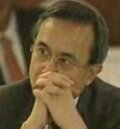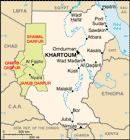Bingfeng asked where the FLG get their money. AsiaPundit has no idea. But it seems another Far Eastern spiritual movement cult sect get a significant chunk of change from running a near monopoly on US sushi restaurants.:
Adhering to a plan Moon spelled out more than three decades ago in a series of sermons, members of his movement managed to integrate virtually every facet of the highly competitive seafood industry. The Moon followers’ seafood operation is driven by a commercial powerhouse, known as True World Group. It builds fleets of boats, runs dozens of distribution centers and, each day, supplies most of the nation’s estimated 9,000 sushi restaurants.
Although few seafood lovers may consider they’re indirectly supporting Moon’s religious movement, they do just that when they eat a buttery slice of tuna or munch on a morsel of eel in many restaurants. True World is so ubiquitous that 14 of 17 prominent Chicago sushi restaurants surveyed by the Tribune said they were supplied by the company. [Chicago Tribune]
Technorati Tags: asia, east asia, japan, korea, sushi, south korea
 Every time I think I’ve seen the most exasperating demonstration of Korean grudge-holding and hostility towards the Japanese yet, I’m trumped by the discovery of another even more outstanding gem of idiocy. This time, it’s a TV event, amongst whose participants is Japan’s ambassador to Korea, Shotaro Oshima, the recipient of a rather special sort of attention. Pay particular heed to the closing portion of this clip and listen carefully: even if you don’t understand a word of Korean, you ought to be able to recognize at least one word there.
Every time I think I’ve seen the most exasperating demonstration of Korean grudge-holding and hostility towards the Japanese yet, I’m trumped by the discovery of another even more outstanding gem of idiocy. This time, it’s a TV event, amongst whose participants is Japan’s ambassador to Korea, Shotaro Oshima, the recipient of a rather special sort of attention. Pay particular heed to the closing portion of this clip and listen carefully: even if you don’t understand a word of Korean, you ought to be able to recognize at least one word there. “Recently Japanese illegal trespassing on Dokdo (Takeshima) has been increasing frictions”
“Recently Japanese illegal trespassing on Dokdo (Takeshima) has been increasing frictions”
 The essential reason is oil. China traditionally was self-sufficient in oil, but since 1993 it has been a net oil importer and it is increasingly worried about this vulnerability.
The essential reason is oil. China traditionally was self-sufficient in oil, but since 1993 it has been a net oil importer and it is increasingly worried about this vulnerability. Park Jin Sung, the 30-year-old founder of a wireless-technology company, combs through a rack of button-down shirts at a clothing shop. After close scrutiny, he picks out one in light blue that has a stiff, narrow collar and buttons spaced just right, so that the top two can be left open without exposing too much chest.
Park Jin Sung, the 30-year-old founder of a wireless-technology company, combs through a rack of button-down shirts at a clothing shop. After close scrutiny, he picks out one in light blue that has a stiff, narrow collar and buttons spaced just right, so that the top two can be left open without exposing too much chest.
































